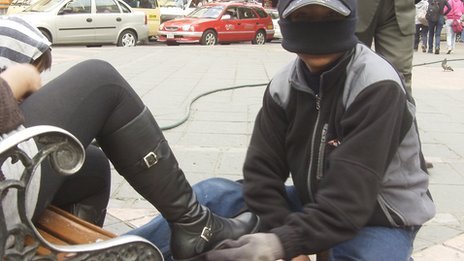Child labour is now a hard and unavoidable reality of developing countries. Many of us are obviously against child labour and its conditions, causing us to stop buying from a certain company or signing petitions to stop such atrocities, but does this really help? Or do the many layers of this complex situation make it hard for us to really make a difference?
After spending months in Bolivia, I have spoken to many working children that earn money through shining shoes on the city streets of La Paz. These children work long days and earn 62% less of the minimum wage in the country. Shining shoes is regarded as an extremely low job within society and the children are vastly discriminated against, causing those who work in the trade to wear masks to disguise their appearance from the public. Boys and girls as young as 8 years old begin working on the streets to either bring income home for their family, or because poverty has forced them to live on the street.
Initially, people may think that you shouldn’t partake in the service offered as the children should not be encouraged to work on the street in the first place, but the reality is that until changes occur higher up the ladder this is the only income that the individuals can receive. If the child worker does not shine shoes, they have no chance to pay for basic human needs such as health care or even food. Many are forced to give up their education in order to earn much needed money, and instead work through the abuse and vast discrimination received by passers-by every day. However, there is no short term solution to this problem, and currently within developing countries opportunities for the right to education and equality are at a far distance. Though I am in no way an advocate for child labour, it seems that the only way these children could have a chance to achieve an education is to earn the money their family needs to pay for it – and therefore the only way for passers-by to help is by paying them to continue their work.
Shining shoes is a tough job for little pay on the streets of La Paz, from morning to evening facing public disapproval. Each pair of shoes they shine only earns 2 Bolivianos, not even the equivalent of one British pound, making it hard on the children who are depended on as the ‘bread winners’ for their family.
So who is there to help? I would like to introduce the organisation Hormigón Armado, a non-governmental organisation set up to provide the shoe shiners better opportunities in life. This organisation has developed the fantastic idea of having the workers write in newspapers and sell them at 4 Bolivianos each. These papers are written in weekly workshops and the idea is similar to the ‘Big Issue’ papers in Britain, but unlike the latter, the shoe-shiners keep all of the money they earn. Furthermore, Hormigón Armado has created tours led by the shoe shiners, giving an alternative and more involved route for tourists. The organisation focuses upon putting children into education, or adult shoe shiners into educational courses, by providing weekly workshops on Saturdays that teach health education, sex education, politics and much more – also providing a breakfast for the attending shoe shiners and their families. Hormigón Armado continuously works to create new opportunities for their shoe shiners; the newest aspect of their work is to produce a vegetable patch in central La Paz so that the shoe shiners, especially children, can have food security, promoting urban agriculture and serving the basic human need of food.
Hormigón Aramdo is a small organisation consisting of one social worker and a group of volunteers, based in the city of La Paz. The organisation reaches out to 50 shoe shiners and their families, providing support to enable these people a better life. For the child shoe shiners this organisation provides opportunities to education that they wouldn’t otherwise receive, and though they can’t afford to stop working, they are at least being given the chance for an alternative route in life.
The work Hormigón Armado does is brilliant, however there are many more children within La Paz that suffer through child labour, working long tireless hours every day for that tiny sum of money. As already mentioned, there is no short term solution to this problem, but there are some things, no matter how small, we can do to help. Thinking about the products you buy, considering where they have come from, and the conditions in which they have been made will help you better judge whether or not you want to support a product or company’s policy. Putting money in a pocket by allowing a child to shine your shoes is one thing, but supporting a company that chooses to exploit societal and monetary pressures and hire child labour is a completely other scenario. Whilst small organisations such as Hormigón Armado are making a difference to individuals on the ground, these atrocities need to be addressed on a global scale and perhaps a little more digging is needed to be done to find out why exactly these children have ended up in such dire straits in the first place.
We need to work together to end these atrocities on a global scale – think about the products you buy: where they have come from, the conditions in which they have been made, the price they are being sold at and who could possibly suffer because of this price. There are small organisations out there like Hormigon Armado that make a difference, but to end all exploitation of children this needs to happen on a global scale.

